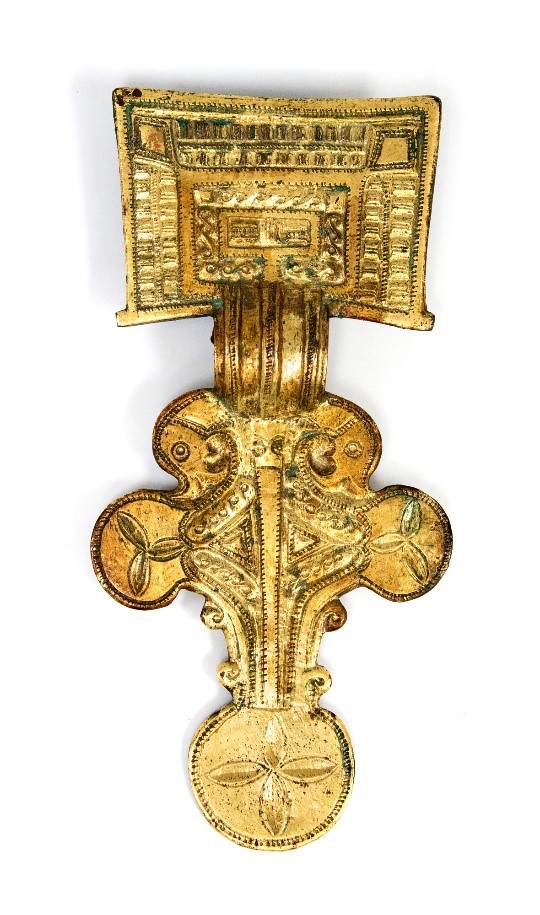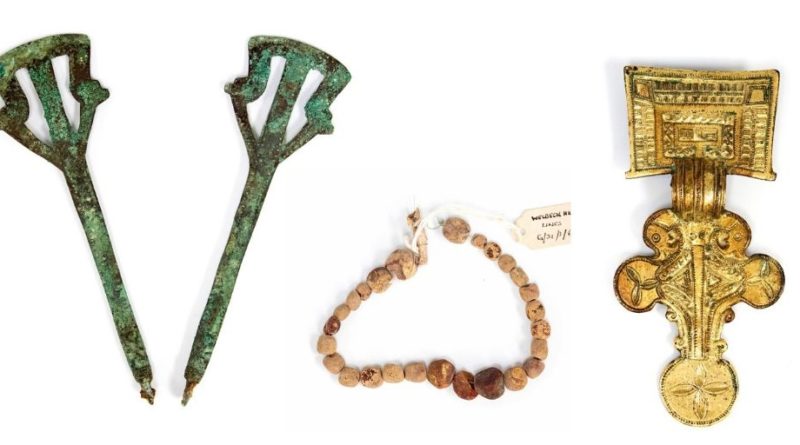Anglo-Saxon treasures in Derbyshire sale
Hundreds of Anglo-Saxon objects which shed light on life in England 1,500 years ago could fetch a five-figure sum at auction.
Unearthed from farmland in Lincolnshire nearly 60 years ago, the objects include a rare, gilt great square-headed brooch which may be unique as well as cruciform brooches, pots, knives, a spear head with attachment for a pennant and silver bracteates (pendants) incorporating runic characters from the early Teutonic alphabet.

More than 250 items recovered during excavations between 1962-1979 of a Pagan Anglo-Saxon site dating back to AD 425-600 will be sold together with documented records. The collection in its entirety will go under the hammer at Hansons Auctioneers on March 26 with a guide price of £30,000.
Charles Hanson, owner of Hansons Auctioneers, said, “These items were used or worn by the first Englishmen and women. They provide a wonderful insight into what life was like for our ancestors. We would like to see the entire collection kept together, preferably in a museum. These objects deserve to be saved for the nation.”
The artefacts were found during excavations which began after the late Gordon Taylor, of Cleethorpes, discovered a piece of bone and pot in a field in 1962. It led to the excavation of one of the most remarkable pagan Anglo-Saxon sites ever found in Britain.

Mr Taylor went on to lead the excavation of the site at Welbeck Hill in the parish of Irby-on-Humber, Lincolnshire. The dig made national headlines and captivated scholars around the world.
More and more antiquities, dating back to 450 to 625 AD, were gradually unearthed including tweezers, scissors, jewellery, amber and pottery beads and a girdle-hanger, which resembled keys and symbolised women controlling the home.
Such was the fascination, students and archaeologists from the UK and overseas volunteered their services, both at the dig and to examine items, many of which were recorded in publications around the world.
Mr Taylor died in 2017 at the age of 88 leaving his collection behind in his home. Under the Treasure Trove legislation at the time, the artefacts did not require surrendering.

His wife Muriel Taylor, 89, said: “It’s so important to me that this collection stays together. I would like it to be preserved in a museum. It’s my late husband’s life work and a crucial part of England’s Anglo-Saxon history.
“Gordon used to enjoy field walking and, one day in 1962, came across a piece of femur bone and a fragment of Anglo-Saxon pottery on the surface. He consulted the farmer who owned the land to gain permission to dig. That was the start of a 17-year excavation.”
In an article for Grimsby Archaeological Society, Gordon Taylor wrote: “Welbeck Hill has yielded finds of great importance including pottery, metalwork, jewellery, textiles, and wood … These objects were made and used by some of the first Englishmen.”

For Gordon, a history teacher, it was a labour of love. He spent most of his spare time excavating the site and researching the finds, which came in thick and fast.
“He hadn’t studied archaeology before but was so excited about it,” said Mrs Taylor. “He was very, very busy with it all, documenting each find.
“Welbeck Hill was Gordon’s life. He did very well, considering he left school at 14 and didn’t pass his 11-plus. He was self-taught and eventually became a history teacher. His research was very thorough and academic which is shown in the extensive and meticulous recordings.”
Countless hours were spent at Welbeck Hill by the father-of-four. Gordon’s son, Geoff Taylor, remembers joining his dad at the dig – and finding an important pot. “A picture of me at the site when I was ten years old was published in the paper,” he said.
Mr Hanson said: “These items were lost in the ground, destined to decay or be churned up by a plough. They’re part of England’s rich heritage and deserve to be on display.”


